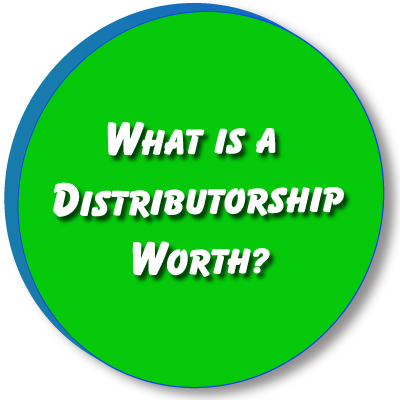A business is an asset with a revenue stream which can be purchased or sold. Businesses can be valued in a number of ways.
One way to value a business is to use SDE (seller’s discretionary earnings). SDE includes the net profit of the business plus any personal income, discretionary income, one-time expenses, and owner salaries that should be added to the net profit.
Traditional businesses are valued at a multiple of 2 to 4 times the most recent 12 months of cash flow plus assets.
Network marketing and direct selling distributorships, however, are valued differently from other businesses.
Why Are These Businesses Valued Differently?
- The income stream of a network marketing distributorship is dependent upon the sales and recruiting productivity of many people, only one of which is the owner of the distributorship.
- The life of an average distributor is relatively short, which means the average distributor’s productivity is limited to a few short months.
- The value of the business is stable only when there is sufficient recruiting of new distributors who will take the place of those who stop working and new customers who will take the place of customers who no longer place orders (attrition).
- The value of the business increases only when the total number of active distributors and customers increases, or the average productivity of distributors increases. The average productivity of distributors rarely increases significantly. What matters most are retention of distributors and customers, and recruitment of new distributors and new customers.
- The growth or decline of the income stream of a network marketing distributorship is difficult to predict, because many factors – both positive and negative – contribute to bottom line earnings.
- The purchaser of a network marketing distributorship may not have the same reputation, skills, work ethic, or results of the previous owner. When you buy the shoes of another person, it does not mean that you can or will run as fast as that person. Similarly, there is no guarantee that you will be as successful as the previous owner when you buy a network marketing distributorship.
- Network marketing distributors are not employees. They are independent contractors, about 30% of whom represent more than one company at the same time. Many will leave one of their companies to focus on another. Others habitually jump from one company to another. Sometimes the departure of one leader leads to the departure of many. The members of your downline are free to leave you or to stop working at any time.
- Unlike traditional businesses, a network marketing distributorship depends on the health of another business for its survival. Above all, the greatest risks taken by the purchaser of a network marketing distributorship are the possible decline of the company’s reputation (which will reduce the attractiveness of the income opportunity to new recruits) and the possible failure of the company in the coming months or years.
For all of these reasons, a network marketing distributorship is valued at one time most recent 12-months cash flow, plus tangible assets, if any, but only when the business is willingly sold.
When a distributorship is terminated by a company and the terminated representative sues for damages, the value received can easily be more than one time most recent 12-months cash flow, because the cash generating asset was taken from a representative who was not seeking to sell it.
When you don’t want to sell something, the price you will accept is higher than it would otherwise be. Everything is for sale at the right price. The right price is the price that both the seller and the buyer agree upon.


 Jay Leisner, the President of Sylvina Consulting, is a top compensation plan and direct selling expert, a trusted adviser to new and established network marketing and party plan companies. For more than 30 years, Jay has enjoyed assessing and improving network marketing, party plan and referral marketing companies across the globe.
Jay Leisner, the President of Sylvina Consulting, is a top compensation plan and direct selling expert, a trusted adviser to new and established network marketing and party plan companies. For more than 30 years, Jay has enjoyed assessing and improving network marketing, party plan and referral marketing companies across the globe.
Leave a Reply